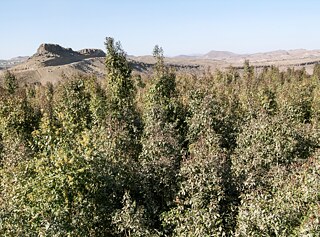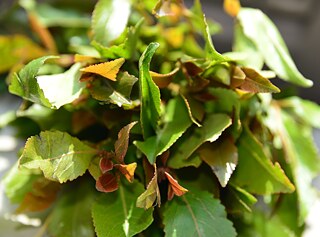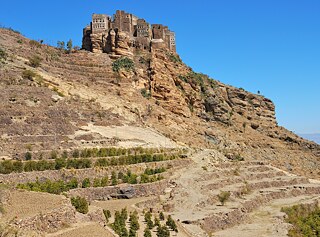After years of war in Yemen, another power struggle is underway: the quiet battle between qat and coffee. Qat, a shrub whose leaves yield a mild narcotic when chewed, is taking over the country’s land, water, and offices. Yet coffee, with deep roots in the country’s soil and history, is fighting back to retain its ancient stature as the emblematic crop of the south Arabian country.
As noon peaked over the villages of Maghrebat Manakha and Al-Hatib, we climbed a steep hillside where terraces of coffee bushes stretched from the valley to the summit. Qat is rapidly disappearing from the fields here as farmers replace it with the more traditional coffee bushes. But the district is an outlier in Yemen, where farmers lured by high profits have removed other crops, replacing them with qat across Yemen’s most fertile farming land.The farmers of Al-Hatib have returned to the traditional Yemeni coffee bush, whose beans are famed for their exceptional taste and quality. In the middle of Al-Hatib, near a famous shrine, we met the septuagenarian village sheikh, a coffee afficionado. He told us how the village had decided, as a community, to return to planting coffee and to uproot qat from its land.
The village association had stepped up to help farmers make the move, aiding with production and marketing to help them get the beans to market. Before long, residents were making a respectable profit, and their terraces were blooming with traditional Yemeni coffee bushes.
The experience of Al-Hatib and the surrounding Haraz district, west of the Yemeni capital Sanaa, has become an inspiration to other parts of Yemen, which have followed suit. A movement is brewing in the southern governorate of Taiz, where several initiatives are working to replace qat trees with coffee. The most prominent is the Bani Sinan Agricultural Cooperative in the Bani Hammad district of Al-Mawaset. Hammadi coffee, named after the region, is considered one of the country’s finest varieties of bean.
The association is hoping to plant one million trees in Taiz Governorate by 2025, in cooperation with other organisations and partners. Some of the trees will be planted in schools and health facilities, and the association is also involved in multiple festivals supporting coffee cultivation.

High Profits Drive Spread of Qat
In recent decades, vast areas across Yemen have been given over to qat production, especially in the country’s northern and western highlands. This has caused far-reaching damage to Yemenis’ health, the economy and society in general. Experts blame the shift on several factors, including the growth of qat consumption among young Yemenis and the acceptance of the drug at social occasions such as weddings, meetings to resolve disputes and even sad occasions. All this has boosted qat consumption nationally. Authorities have done almost nothing to tackle the culture; rather, officials themselves have naturalised it and take part in it.The qat industry enjoys an extensive supply network, meaning farmers can usually avoid the burden of going to market themselves to sell their crop. Rather, wholesalers travel from the cities to buy it while it is still in the field. The resulting savings in terms of effort, transportation and money have motivated many farmers to expand their cultivation of the tree, enjoying good profits with relatively little effort.
The World Health Organization classifies qat as a narcotic, which consumers chew for a mild stimulant effect. The plant is grown in Yemen and the Horn of Africa, then smuggled illegally into nearby Arab countries and further afield, either in the form of green leaves or dried like tea. Farmers use several kinds of pesticides and fertilizers to maximise their production.

The uncontrolled spread of qat cultivation has had negative repercussions for agricultural production more generally, as it occupies farmland that could be devoted to other crops. These include the coffee tree, which was and remains an icon of Yemeni agricultural production. The decline in coffee cultivation has been exacerbated by a lack of government support, high transportation costs and low profits relative to the effort expended in cultivating it. Given the high profits to be reaped from the qat tree, qat has become an economically good option for farmers, contributing to the rapid decline of coffee cultivation in recent years.
Yemen today exports 4,000 tons of coffee a year, to countries around the world, according to country-of-origin certificates the government obtained in 2011. But this number has declined rapidly, from about 22,000 tons in 2018 to 18,000 in 2019. The area planted with coffee trees has also decreased from 35,984 hectares to 30,544.
In response, coffee-lovers have launched multiple awareness campaigns to try to protect Yemen’s agricultural heritage.
Coffee Wealth
“Yemen’s beans, oh pearls, oh treasure above the trees,Whoever grows you will never be poor or afflicted with humiliation.”
These lyrics from the song “Love and Coffee” have helped inspire young Yemenis to support initiatives to restore coffee cultivation as an alternative to qat. The words were written by famous Yemeni poet Mutahar al-Eryani and the song composed and performed by Ali bin Ali al-Ansi decades ago. A remake of the tune was released recently alongside efforts to promote a return to coffee production, stirring nostalgia and a desire among many Yemenis to return to growing coffee as their forefathers did.
Coffee beans first appear on the trees in the form of small green buds, gradually expanding and turning red. Then they are harvested, dried and roasted before being ground for use. There are competing narratives about whether the plant originated in Yemen or the Horn of Africa, but it is generally agreed that the first people to use coffee as a drink were Yemenis. Yemen even has a port called Mocha, a centre of the early coffee trade, which gives its name to the modern caffè mocha or mochaccino, a chocolate-tinted latte.
In his master’s thesis, “The Yemeni Coffee Trade,” Yemeni researcher Arwa Al-Khattabi writes that after the Ottomans expelled Portuguese forces from the coast of the Red Sea in 1538, they set up new trade routes from Yemen through the Red Sea. The trademark Mocka Coffee first appeared in English in 1598. But according to historian Ibn al-Razi, the first mention of Yemeni coffee in Arabic was centuries earlier, in the year 900. Ancient manuscripts indicate that Ali bin Omar al-Shazli, who died in Mocha in 1418, was the first to transport the beans from southwestern Abyssinia into Yemen, and the first to consume it as a drink.
Coffee is grown in many parts of Yemen, and several regions have given their names to corresponding varieties: Al-Hammadi, Al-Fadhli, Al-Burai, Al-Yafei, Al-Raymi, Al-Matari, Al-Khawlani, Al-Ansi, Al-Ismaili, Al-Harazi and Al-Safani. Yemen’s diverse topography means the bean can be produced throughout the year. According to a study published by Bloomberg, Yemeni coffee is now the highest quality in the world and can fetch up to $500 per kilogramme - half a million dollars per ton. This means that a kilogramme of Yemeni coffee is equivalent in price to 10 barrels of oil. Brazilian coffee ranks second in the world in terms of quality, and the country exports 3 million tons of the beans.

Change is Brewing
Yemeni coffee afficionados have been highly active on social media, raising awareness and educating the community to promote a return to coffee cultivation. They have also organised events and activities, including youth initiatives, with the help of commercial institutions. In March, they urged Yemeni café owners around the world to hand out coffee for free to celebrate Yemen’s National Coffee Day, under the hashtag #Aywa_Ban (#Yes_Coffee). A revival of the country’s coffee sector also ties into Yemen’s national identity, which has been impacted by the country’s years-long, bloody conflict. Many activists see interest in growing coffee as a central element of Yemen’s historical identity.Every year on March 3, Yemenis celebrate “Mocha Day,” a national festival to encourage coffee cultivation. This year, the cultural agency in Taiz organised an artistic carnival featuring top Yemeni musicians and comedians, while organisers handed out samples and planted 10,000 coffee seedlings.
The Ministry of Agriculture in Houthi-controlled Sanaa (which is not internationally recognised) has also enshrined March 3 as a national day to celebrate Yemeni Coffee Day, also obliging farming and irrigation offices in various governorates to mark the day. The Ministry of Agriculture also organised coffee-themed events and activities throughout the first 10 days of March to celebrate the bean.
Amin, a coffee merchant who took part in youth-led campaigns to promote the crop, said the initiatives had pushed people to “pay more attention to the coffee trade.” “The future of coffee is bright, but farmers need support from official bodies to help Yemeni coffee return to its status and to keep its quality high,” he said. He welcomed the move by Sanaa authorities to declare March 3 a national day for coffee. “This was thanks to the youth and the movement they led on social media,” he said. “We hope it will become an annual event, showcasing Yemen’s coffee and helping promote assistance and facilities for export.”
The Coffee Guardians Group, an online initiative, was the first to call for March 3 to be a National Coffee Day, back in 2019. It has worked hard to make the initiative a success, but it is not alone. Many youth initiatives and private institutions have cooperated to encourage coffee cultivation in Yemen, holding activities and events bringing together coffee producers, traders, farmers, and others interested and specialised in the sector.
One group of young people organised an initiative called “Your Love is Gold,” a festival aimed a spreading awareness of the ancient history of coffee, which they call “the gold of Yemen”. They handed out cups of coffee to passers-by in the streets, and according to the event’s organisers, also uprooted 450,000 qat trees in the Haraz district and replaced them with coffee bushes. However, farmers continue to face many challenges. “There is a change in the climate. The rain no longer comes at the normal time,” said coffee farmer Mohammad.

Despite the prevalence of qat cultivation, the growth of community initiatives to promote a return to coffee production reflect growing public awareness of the importance of preserving Yemen’s coffee trade. These initiatives also come as Yemen faces the sad consequences of qat cultivation for the environment, the economy and human health.
A return to growing coffee could offer solutions to many of the problems associated with the spread of qat cultivation across Yemen. Despite the destruction wrought by years of war, many Yemenis are proud to produce coffee, promoting the dream that the morning beans of coffee will triumph over the evening leaves of qat.
November 2023
